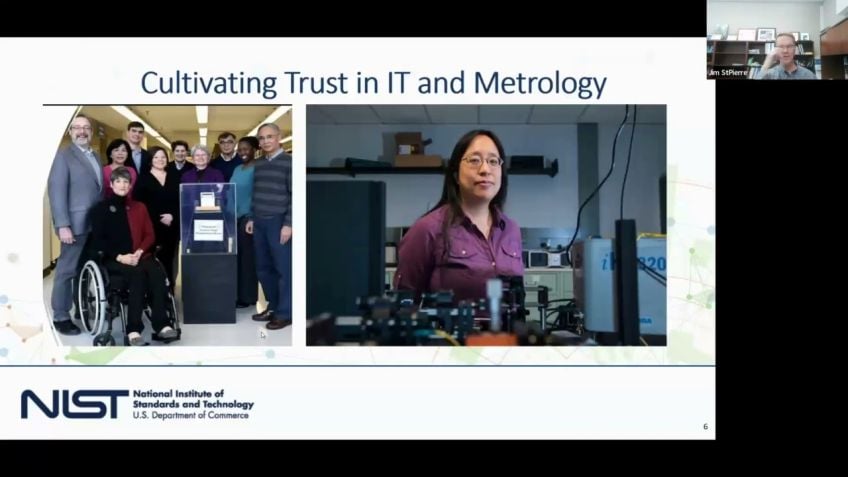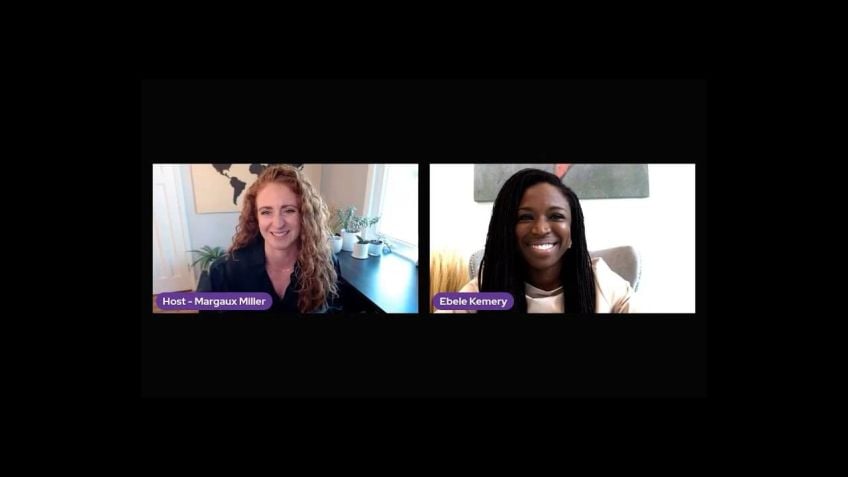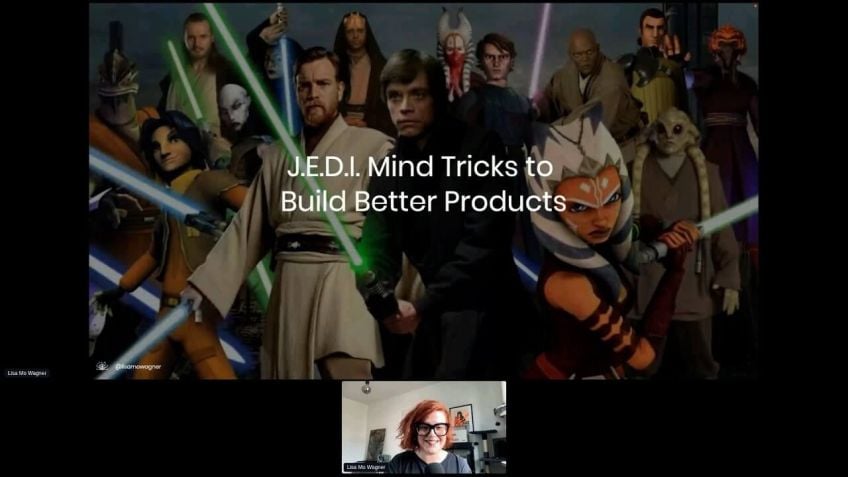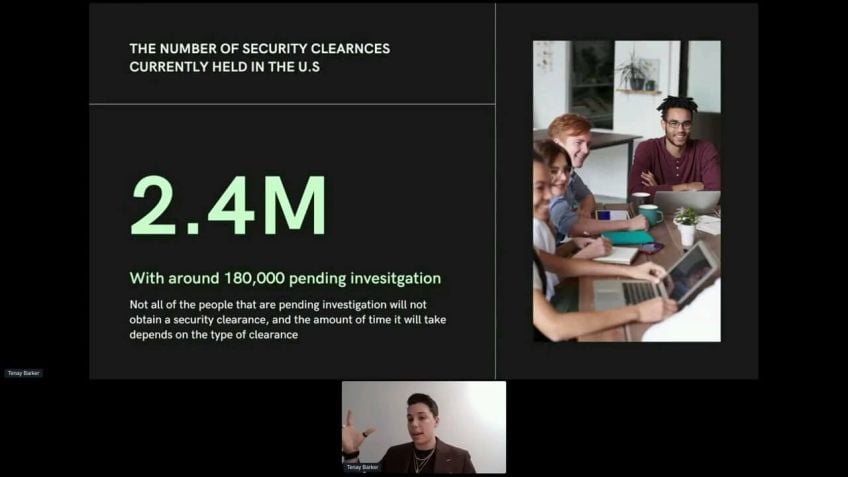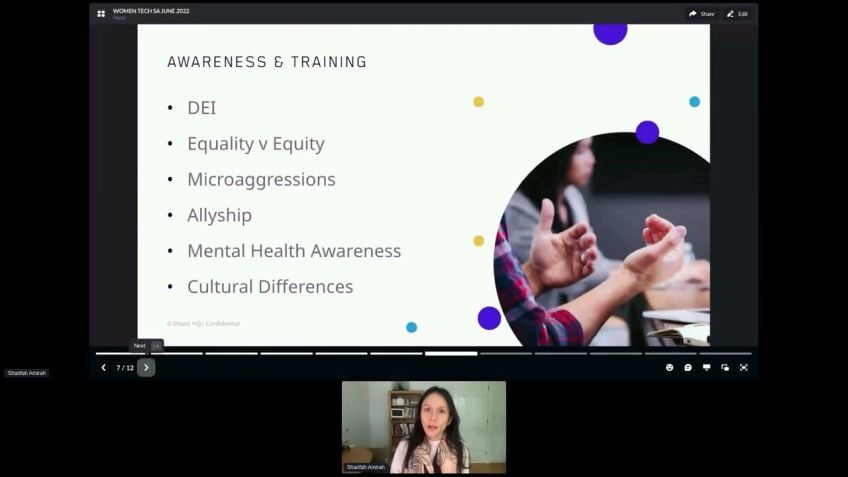Life in the “Second Closet” – Diversity Challenges in Classified Environments by Tenay Barker
A Prominent Voice in the Tech World: Navigating Diversity, Equity, and Inclusion in the Defense and Aerospace Industry
Meet 10 Barker, nicknamed "10 A", a Site Reliability Engineer at Microsoft, who is pioneering diversity, equity, and inclusion (DEI) landscape in the defense and aerospace industry. With a background in software engineering, they have drawn from their past work experiences in the defense contracting sector to form a clear perception of the areas that need improvement. In this intimate article, Barker shares a candid first-hand account of their journey navigating the highly specialized tech industry as a non-binary, masculine lesbian.
Struggles for Diversity, Equity, and Inclusion in the Defense Industry
Barker notes that the defense and aerospace industry holds a significant position in the tech world, given its role in protecting U.S citizens and their data. However, attracting and retaining clear talent is a significant challenge. This issue is exacerbated when the limited hiring pool and tedious hiring processes come into play, constricting the representation of diverse identities in the industry.
As Barker eloquently explains, the glamour and prestige of working in such an industry do not negate the “lack of diversity, equity and inclusion, very much lacking in this industry.” The situation is particularly dire in classified areas.
The Impact of a Lack of Visibility
Visibility, or rather the scarcity of it, is a recurring theme in Barker's narratives. According to ZipRecruiter.com, about 7-8% of software engineers identify as LGBTQ+. Meanwhile, the military, which often pairs with defense industry companies, consists of about 41% minority groups, further narrowing the spectrum of representation in the workforce.
The paradox of it all, Barker reflects, is that despite the inclusive claims made by companies, the reality is a workplace culture starkly contrasting with the promised inclusivity. When it comes to retention, the issue becomes more palpable with a high turnover rate. Factors contributing to this include the lengthy hiring timelines, lack of transparency, insufficient access to tools, lack of career flexibility, and, not surprisingly, the workplace culture.
Gearing Up for Changes in the Industry
However, the future is not bleak as Barker believes that companies in the defense and aerospace industry can make positive strides towards diversity, equity, and inclusion. Strategic initiatives like reverse mentorship, where senior leaders learn from early career employees, can catalyze changes in workplace culture that are long overdue.
However, the first step towards change is acknowledging the problem. By carrying out extensive research into the demographics of these industries and giving due attention to the voices of affected individuals, companies can begin to understand the limitations of the current system and strategize a more inclusive approach.
Moving Forward: Authenticity is Key
In a utopian work environment, every individual is valued for their unique self, which in turn fosters an atmosphere of inclusivity. However, the reality often contrasts with this ideal, but strides to improve are being taken and amassed slowly but surely. In closing, Barker emphasizes, “to change this workplace culture… Develops are humans. First and foremost, we should value authenticity… When we come together and celebrate the differences, we all bring, we can all make the world a kind safe and more secure environment for all engineers."
+Feel free to connect with Barker [Linkedin profile]. They are eager to assist in any way they can in fostering a more inclusive environment in the tech world.
-->
Video Transcription
Hello, everyone. Good afternoon to wherever you're calling from.
My name is 10 Barker or 10 A as my nickname is um my pronouns are they them theirs? I'm a site reliability engineer for Microsoft. What exactly that is? Uh since a lot of people don't really know uh is I make sure that uh the office 365 apps are up and running for our government customers here at Microsoft through the Air Gap cloud. Uh So it's kind of relatively new uh and it's kind of being worked on at the moment. And so I've been, had a really good experience working here um as an SRE my background's in software engineering and I previously came from a defense contracting company before uh coming here to Microsoft. So I welcome you all. Thank you so much for Woman Tech Global for allowing me to platform to speak today. Uh This being my first ever professional speaking event. Um So I'm a little nervous, but I'm very, very excited to be speaking to you all today and I thank you every single one of you all for attending and hope to help give my message and share my story with all of y'all today.
So sending positive vibes and positive positive energy to every one of y'all. The defense and aerospace industry has been a long standing part of the tech world that has helped protect the United States citizens and their data as the need for more security is demanded. And especially with cyber technology being used at a as a as a stakeholder and throughout the world, the need for technology to be secure, compliant and trusted is at high demand for talent and not just any talent cleared talent. With this specialized area of technical engineers, there are processes and policies put in place that make the hiring pool very, very small and not only is there a long, very cumbersome process to obtain clear engineers but retention tends to be the biggest problem that faces this industry, there can be several contributing factors.
But uh along with uh trying to obtain clear engineers and retention and I've seen a lot in my time working in the defense industry since I've been here and working in this industry for the past three years. But from my point of view as a non-binary, masculine lesbian, I can say that I believe that a major point of pain is a lack of diversity, equity and inclusion that is very much lacking in this industry. And it's not just these types of companies but in classified areas, specifically areas where not a lot of people talk about because well, not more people know that they exist. Um So I'm gonna talk a lot about skiffs and clear areas. Um If you're not familiar with the classified environment, what a skiff and cleared area is, is a specialized area located within a company that is on a secured network. It's using classified information. Uh It's basically where a lot of uh work is done, whether it be with different parts of the government or intelligence agencies or whatever. Um So it's uh very secure in the sense of that, you know, you cannot take your phone, you cannot take any type of Bluetooth Act activated advice. You cannot take anything, can transfer data, no Apple watches, no fitbits, no airpods, nothing of that matter.
Even pacemakers sometimes um can get flagged and you have to get like a special request form. Uh So that is what a security area is like. So I, you basically have to scrub yourself of any of that in um devices before even entering your office. Um It's literally a big metal heavy door it, and it's, it's quite intimidating, to be honest. It looks scary, but um that's what a secured area is and that's what I worked in. Um And I continue to actually work in here at Microsoft as well. Uh So now surprise, you know about what a ski and cleared areas, but don't worry, I'm not gonna have to write, wipe your memory just because I told you after this talk, but why do these spaces even matter? Why am I even talking about this? Um because these are very small secluded spaces obviously and they're not as visible. So why am I even here? Well, hopefully this story that I'm sharing with you all today can paint a pic, better picture about why I'm why, why I'm even talking to y'all. So when I came out, it's obvious to any person that I am a lesbian and I am gay. Um I was deep in the closet for the 1st 21 years of my life over by the handy downs and the button up shirts that I'd wear more than once. Everyone was sitting outside waiting for me to come out opening the door letting me through and I decided not, I'm gonna stay right here. Right? Ne Next. This fuzzy coat. Yeah, I'm gonna stay right here.
But I finally decided to take that leap of faith to become the person that I always knew that I was destined to be to be my happy little lesbian self. So I finally opened that metaphorical door and walk through it. Everyone around me. All my friends and family were so accepting and collectively said finally, now I know it's very comedic and yes, through that time, I was very ups, not very upset, but I was jokingly upset with everyone for letting me flail around my sexuality like a fish because it came right?
And I finally realized that tonight you are a lesbian. I truly became the person that I was always meant to be. So I'm out and open as a lesbian living my life authentically as it can be. Life is great. Life is gay. I'm gaining the confidence I desperately need to finish my college degree. I had a job already lined up being one to be working as a software engineer for one of the biggest defense contractors in the United States. I was prepared to face more of my imposter syndrome to learn and grow and start my career and take in all of this experience. But there is one thing I wasn't prepared for it was that I'd be tempted to go back into the closet. Can you imagine struggling with that coming to terms with your sexuality for the first half of your life, basically, for decades of your life, to take that giant leap, to be the person that you've always meant to be and always felt that you were destined to be. But to only feel pressured to retreat back into a space that you had thought that you left a space that had held you back. This was my experience working in the defense and aerospace industry, going into a skiff every day isolated from the world to only feel that I was entering a space that I thought I left. When I came out, it was very defeating.
It was very scary and it was very lonely and I'm not gonna say that I only felt negative emotions and feelings out of this experience, but it made me value the growth that I'd gone through to realize what I valued in a workplace to be authentically myself. I thought I'd be ok knowing my company had, er, GS and what seemed to be support for its employees of all backgrounds. But there was a very much of a different environment that was, that was through that he heavy metal door and I'll explain that environment in a little bit. Now, here's some statistics that I, I'm gonna share with you all today. So currently there's around 462,000, 452 software engineers in the United States. This is a 2020 stat from Zip a.com. 7 to 8% of those engineers identify as LGBT Q and that's also from zip.com. And then we look at our military as well and our military is around. Oh, that's wrong side. Oopsie. Uh 41% of our military identifies as members of minority groups. And that's coming from the defense government website. So you can see the visibility of someone who works as a minority in the defense and aerospace industry is very, very, very small.
And then you look at people that hold security clearances, which is 2.4 million people holding security clearances. This is a national privilege that not everyone is granted 100 and 80,000 people are currently in the process and pending investigation of a security clearance, not all 100 and 80,000 will be getting those security clearances because again, this is a national privilege. So the visibility of underrepresented groups is super low because you take into all of these factors of being a minority, being an engineer working in defense and aerospace, holding a security clearance. All these factors make it very low and very, very low to see someone that looks like you if you consider yourself a minority. So, but and data hasn't even really been collected right now. Data is just now being collected by the Department of events. The military is also having strives for change. The military and the Department of Defense are striving to help change the imbalance and lack of minorities in leadership and help attract more diverse talent. So the question that I have is why shouldn't tech companies that are supporting and these industries also reflect that why are
the companies
that you know, are helping directly support military and the Department of Defense and Intelligence Agencies not also having the same drive and passion to put more diverse engineers behind these pa the parts of the government that are basically making sure that our world, our nation is safe.
So with security clearances, I said before that it's a very long and very cumbersome process to obtain a security clearance. And this is kind of what I mean, depending on what type of security clearance you're gonna get is gonna be how long it's gonna take. So there's two types of clearances you can obtain a secret clearance and a top secret clearance. A secret clearance right now is going around 65 days for processing according to um the defense counterintelligence and security agency for that 65 days of them collecting information about you and going through it and making sure that you are, you know, compliant to actually hold a hold government information for tops of your clearance.
It's around 100 and 19 days. And that again is just for the clearance itself, you add a polygraph to that, that's gonna extend that time way beyond what you see. Sometimes people are needing, you need a polygraph as well as your secret clearance or top secret clearance to work in certain areas to work in certain environments, to work for certain companies. And so a polygraph can make that 100 19 days turn into two years and you spend your time waiting for your polygraph test to waiting to get that taken care of and then have to go through the adjudication process, which again takes a long time. So you're sitting waiting for two years, not knowing if you're going to even get the access to actually work in these environments just to kind of put that in perspective. And so when I first joined my previous company, I was put in a group called Aces and what Aces was awaiting clearance, employee support. And that is a bunch of engineers who are in the same boat as me waiting for their security clearance to come through. You can't work on anything that is on the program that you're assigned to. You don't even know what your program even does.
You can't basic like you're not even able to code unless it's unclassified work and that's few and far between that, that comes into play a lot of the time it was engineers sitting in a cubicle basically waiting for the security clearance, whether it be doing their own training, teaching themselves or if they're lucky working on unclassified stuff.
And you're sitting there for two years doing that at this company, I didn't understand it and it was very heartbreaking, heartbreaking to walk in my first day of work. So eager to start making an inspiring change and coding and developing products to be sat at a desk without even a computer. That was my experience and it was very disheartening knowing that that was gonna, that I was meant to basically teach myself for the next two years. And then whenever you get into your program, you can, you don't even know what you're supposed, you're what you're gonna be doing. It's a lot of lack of transparency. No one under no one knowing what they're supposed to be doing. Um And so being that these companies also pair with the military So if you do come from the military, it makes it a lot easier to go through this process because you already obtained your security clearance. All of this background investigation stuff is done. Um It makes it very easy for them. But at the same time, if you think about how, again, what I talk about visibility, if you see that the military also is paired with these companies as well as the tech industry already being male dominated as it is today. Whenever I went through that heavy metal door, I was met with a sea of straight white male. Again, not a lot of visibility for people like me. I didn't see anyone who looked anything like me.
Nothing close to me when I decided when I finally got into my position and I got my clearance and I went through those skiff doors for my first day and got my desk. I purposely flew pride flags at my desk for people to know that. Yes, I, yes, I identified this way. I'm proud to identify this way. Um And to make sure that other people knew that I was a safe space. I was the only person on my floor that had pride flags on my desk. I didn't see pride flags anywhere else, not with another person, not at another desk. I didn't, I didn't see anything. I was the only person and they were loud and proud just like me. So the dod has put an issue in place to, to address the concern for diversity and to provide reform to address issues. So I believe that the same emphasis on improving culture needs to be pushed to the contractors of all type. This is an actual um memorial that is from the Department of, I believe the Department of Defense to advocate to make inclusion more um impactful in the military. Uh So I need, I think that this same type of initiative needs to be put in defense contractors and defense companies that work with, with the military, with the Department of Defense and Department and um intelligence agencies.
So I would like to recommend that a investigation be done on the demographics surrounding cleared areas and look at the retention of engineers in these areas as well. Based on the data that is collected, we can create a blueprint to help identify problems and make improvements on when it comes to changing the demographics and how we can make these spaces more inclusive and how we can start attracting talent for these types of spaces and areas.
Um And programs in my time working the defense contracting, there was a high turnover rate for engineers and that, that engineers that came in and got out very quickly. Um And I didn't really understand why people were leaving so quickly until I actually got into the secured space right now. Indeed.com shows that there are 49,884 engineering jobs as a security clearance. And that number is only going to grow. It's only going to grow if we don't hold on to the engineers that are currently in their positions right now. And again, there's gonna be a reasons why they're not being reason reasons why that engineers are leaving right now. It's because of retention. Retention was always a problem within my previous company. It was always what someone talked about. I would meet many engineers that were new to the company that left or planned to leave within the first two years, I would talk to my coworkers and some of them even planned to leave shortly after I had left. There were several reasons for this. Everyone that I talked to um had different reasons. But the bottom line is that these talented engineers were leaving the defense and aerospace industry leaving many jobs open.
But at the time, it takes to obtain a clearance, like I mentioned before, it makes it even more difficult to fulfill these jobs. So whenever you uh if you do have a security clearance and you're able to get a job with a defense contractor, you get major sign on bonuses because again, not a lot of people hold these security clearances and they are so hard to get. And that's why retention is hard to when it retention comes, is very hard when it comes to the defense and aerospace industry. And there's been many reasons identified on why it's so difficult to retain technical talent in the defense industry. Some being the lengthy hiring timelines, like I mentioned, lack of transparency, insufficient access to adequate tools, lack of career flexibility and finally workplace culture. That was something that I noticed after I left my previous company and I started working for Microsoft. The workplace culture was vastly different.
I sometimes you in my previous company, you could see it in the different departments. But when it comes, when you were as an engineer, it was basically the same within the industry. There is a culture of employees being seen as things that produce product, not seen as humans with a certain skill set. And that could be from the military defense aspect. Um It could be a lot of contributing factors, but that was basically what it was. That's kind of like how I felt that I was only there as a coding, a coding monkey, a producing monkey. Um And this and this brings me to another story that I have. Um whenever I was working uh at my previous company, I had transitioned to a new team and a new um a new um a new team within my company. And I was gonna be a software engineer for that team. And I remember interviewing with the manager, talking to the manager about what they needed and what I could provide. Um And so I was talking to the manager and they had my resume and they were reading through my resume, looking at all of my skills that I brought and in my resume, I purposely leave all of my de and I work, I previously moved from Dallas Texas to Seattle, Washington.
And in Dallas, I work on two nonprofit boards as well as also being the VP of my company's er G for LGBT Q Plus. I held all these titles and did a lot of work for the LGBT Q plus community in Dallas Fort Worth area and was proud of it. And so I have that bright, bright and bold on my resume, like the pride flag. And I remember my manager reading this and I explaining to them that this is something that's really important to me that I love the E and I work, I love to make my space more inclusive. And the answer that I was met with was is this D and I were gonna interfere with your actual work. And I was shocked, I felt that none of the work that I was doing to make the world a better place was going to be supported and or wanted and I felt scared to do anything that had to deal with the eni I felt that I was having to do stuff under the radar behind my manager's back, so I didn't get yelled at or get fired.
Um And that made me very scared and I didn't feel supported and I was met by multiple managers that told me when I opened up to them about my imposter syndrome, about me feeling that I was never gonna be adequate as an engineer that I was never going to suffice or build myself into a better engineer.
And I was met with, well, maybe you should stop doing your nonprofit work and go learn how to code again. So with the combination of low retention rate for younger employees, as well as availability of these minorities and established workplace culture in these cleared areas, it can be intimidating to think that there will ever be a time where aerospace and defense can be able to be a leader in this industry.
I do believe that airspace and defense can be on par and be the driver of DEN I initiatives. The intimidation factor comes with that den I trading doesn't help educate employees on unconscious biases, microaggressions and how not to create ethical problems. They do make you go through that.
But again, it's not an emphasis, it's not to pay attention. It's just to get it done. Personally, I find the best way to foster this type of environment especially is with senior leaders and managers and that is through reverse mentorship. I find that reverse mentorship is probably one of the best ways to help create more of a culture of compassion and empathy in these environments. So we should try to push more on reverse mentorship and or reverse allyship with senior leaders and managers with younger early career employees um as well, employees that have um that are from these minorities and backgrounds and people of color in LGBT Q to help drive a culture of empathy and compassion so that we see people as people and engine and not engineers as just product producers.
That way that this will have more impact as well is only if people that do this river mentorship can have an open mind and open heart. You know, uh you don't have to completely agree, but you do have to have an O and A, you have to be open, understanding and learning. Always in an ideal world, everyone should be able to feel empowered and embraced for being their true, authentic selves, to feel welcome in the space that values people that are different. When we work together to change the current workplace culture, we can help fight the problem of keeping engineers working in the defense and aerospace industry, especially those engineers that go through the demanding work of obtaining a security clearance, a national privilege that not allow people hold for the future of defense and aerospace.
In these cleared spaces. There needs to be a drive to create the cultural inclusivity and support for LGBT Q plus engineers by providing DE I training on classified side as well as the emphasis on it to pay attention and to learn. Um government and defense contracting companies cannot just say that it's diverse equitable and inclusive. Without looking at one goes behind goes behind these s doors. Literally, we need to foster an environment of diverse mentorship for senior leaders that work in these gifts with newer engineers and especially those identified within the community. We need to adapt an open and willing to grow mindset that'll help pave the way for holding retention for these newer and smarter ambitious engineers to break out of the mold of that developers
are only there to work and deliver products.
Developers are humans. First and foremost, we should change this workplace culture. The value authenticity that someone brings to a team contract or any organization always maintaining individuality is something that I have learned and ever and have abided by ever since it's been told to me.
Is it so help me to inspire, to help everyone to feel that they are valued for the person that they are and represent for the future of tech, for the future of defense. When we come together and celebrate the differences, we can all we all bring, we can all make the world a kind safe and more secure environment for all engineers. Thank you and feel free to also connect with me and thanks for being you guys. I really appreciate it. Thank you. Thank you, everyone. Thank you. I really appreciate all of you sending all positive vibes and energy to all of you all today. But yeah, feel free to let uh uh linked in with me, connect with me. Um If you have any questions, comments concerns or if you ever need my help, I'm here for you hype person, first and foremost. Um And I'd be happy to help in any way that I can. So, um thank you all. Thank you. Thank you. Appreciate it.

